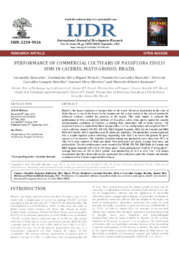Performance of commercial cultivars of passiflora edulis sims in Cáceres, Mato Grosso, Brazil.
Performance of commercial cultivars of passiflora edulis sims in Cáceres, Mato Grosso, Brazil.
Autoria: RONCATTO, G.; WRUCK, D. S. M.; MARCILIO, H. C.; BOTELHO, S. de C. C.; OLIVEIRA, S. S.; ROMANO, M. R.
Resumo: Abstract: Brazil is the largest producer of passion fruit in the world. However, production in the state of Mato Grosso is one of the lowest in the country and this is due mainly to the lack of genetically enhanced cultivars suitable for growing in the region. This study aimed to compare the performance of five commercial cultivars of Passiflora edulis Sims grown under the specific environmental conditions of Cáceres, a leading fruit production hub in Mato Grosso. The experiment was of a randomized block design with a 3 x 3 m configuration and comprised five P. edulis cultivars, namely FB 200, FB 300, BRS Gigante Amarelo, BRS Sol do Cerrado and BRS Rubi do Cerrado, with 4 repetitions and 10 plants per repetition. The production system employed was a simple espalier system involving supporting wire held 2 m above the ground by posts spaced at 6 m intervals. The variables analyzed during one production cycle from June 2013 to July 2014 were number of fruits per plant, fruit production per plant, average fruit mass and productivity. The best performances were recorded for FB200, FB 300, BRS Rubi do Cerrado and BRS Gigante Amarelo with 128 to 188 fruits plant-1, fruit production of 31.60 to 37.40 kg plant-1, average fruit mass of 195 to 249.5 g fruit-1 and productivity of 25.1 to 41.4 t ha-1. Our results demonstrate that these four cultivars are appropriate for cultivation under the climatic and edaphic conditions of the Cáceres region in Mato Grosso.
Ano de publicação: 2021
Tipo de publicação: Artigo de periódico
Unidade: Embrapa Agrossilvipastoril
Palavras-chave: Cultivars, Edulis SIMS, Fruit products, Maracujá, Passiflora
Observações
1 - Por padrão são exibidas publicações dos últimos 20 anos. Para encontrar publicações mais antigas, configure o filtro ano de publicação, colocando o ano a partir do qual você deseja encontrar publicações. O filtro está na coluna da esquerda na busca acima.
2 - Para ler algumas publicações da Embrapa (apenas as que estão em formato ePub), é necessário ter, no celular ou computador, um desses softwares gratuitos. Sistemas Android: Google Play Livros; IOS: iBooks; Windows e Linux: software Calibre.
Acesse outras publicações
Acesse a Base de Dados da Pesquisa Agropecuária (BDPA) para consultar o acervo completo das bibliotecas da Embrapa.

